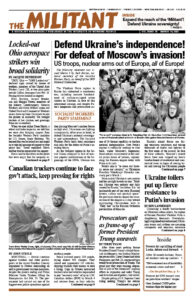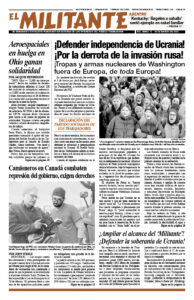MONTREAL — Attacks continue against truckers and other participants in the recent Freedom Convoy organized in Ottawa demanding an end to government vaccine mandates, despite the protest ending and Prime Minister Justin Trudeau lifting the Emergencies Act Feb. 23. The government had carried out one of the biggest-ever police operations against working people.
Police arrested nearly 200 people, laying almost 400 charges. They seized and impounded 115 vehicles, denying truckers their means to earn a living. Cops in Ottawa instructed truckers who had vehicles impounded to pay “recovery costs” of up to 1,191 Canadian dollars ($939) by March 4 and retrieve them, or their vehicles would be “relocated.”
Using the emergency powers, the government ordered banks to freeze, without warrants, the personal and commercial accounts of convoy organizers, participants and supporters. Some CA$7.8 million in more than 200 accounts was frozen before the government instructed banks to begin lifting the restriction. The cops say they are continuing to track down protesters.
Convoy spokespersons Tamara Lich and Pat King were thrown in jail and denied bail. Lich, who is a former leader of the western-separatist, pro-capitalist Maverick Party, faces several criminal charges.
“With hundreds facing charges and more to come, Canada’s capitalist rulers are continuing to punish participants,” Philippe Tessier, the Communist League candidate in the Marie-Victorin constituency in the coming Quebec by-election told the Militant. Tessier works for Canadian National Railway as a conductor and is a member of the Teamsters union.
“Trudeau’s criminalization of this protest is a threat to the rights of all working people,” Tessier said. “One of the charges against Lich is ‘interfering with the lawful use and operation of property’ — a charge that could be used against striking workers.” The CL leader urged unions to campaign for all the charges to be dropped, and all confiscated vehicles returned.
Unions should oppose gov’t attacks
At the En Route truck stop just west of the Quebec-Ontario border on Feb. 27, truckers were interested in discussing the many attacks they face from trucking bosses, brokers and the government.
“Companies pay less to immigrants because they know they have to work to get immigration papers,” Saragjeet Singh, from Ontario, told this worker-correspondent. Bosses try to instill fear of deportation among immigrant workers to drive down the wages and conditions of all working people.
Singh purchased a Militant subscription along with Teamster Rebellion, the first of four volumes by Farrell Dobbs that recounts the successful strikes and organizing drives that brought hundreds of thousands of over-the-road drivers into the union in the 1930s in the U.S. Midwest.
Singh eagerly took the Feb. 15 statement by the Communist League: “Oppose Ottawa’s Emergency Act! Defend the democratic and political rights of working people!” It says, “Unions should oppose Ottawa’s attacks on our rights” and “break from supporting one or another capitalist party, and build a party of working people.”
During the protest, a “Joint statement by Canada’s Unions on the Ottawa Occupation” was published by the Canadian Union of Postal Workers. It condemned the convoy as “an angry mob” and called on the government to end the protest.
“That statement did not serve the interests of working people,” Tessier said. “It repeated almost word for word Trudeau’s smear campaign.”
“It was in the interest of Canada’s ruling billionaire families that the government used the Emergencies Act,” Tessier pointed out. It sets “a precedent for future use against working people and our unions defending our rights and improving our working conditions.”


